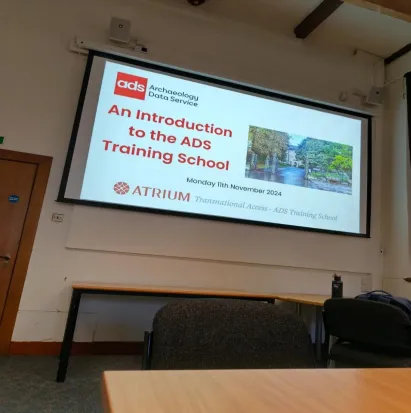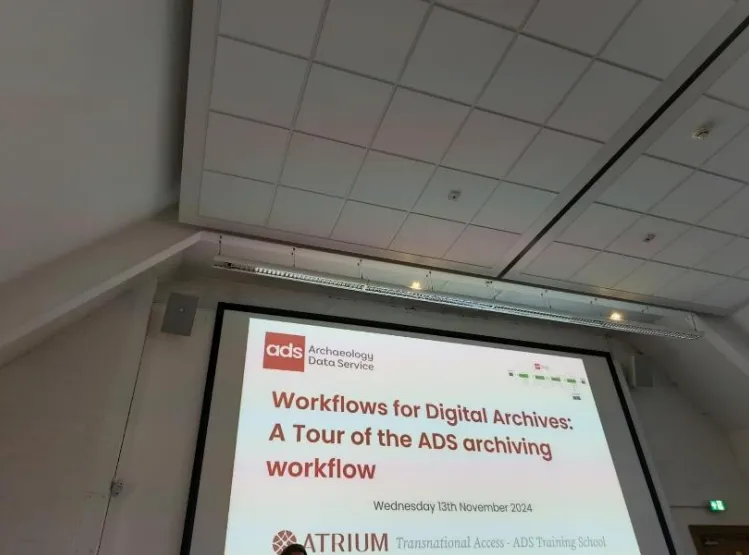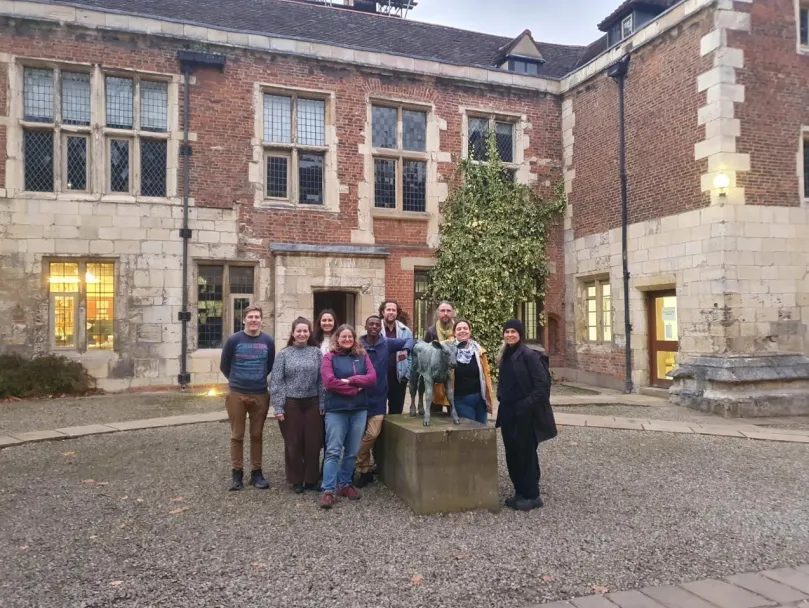
ATRIUM Training at Archaeology Data Service, University of York
Peter Chege Gathoni from Nairobi, Kenya and the British Institute in Eastern Africa.
I’ve just returned to Nairobi, Kenya from a visit to United Kingdom to attend the ATRIUM Transnational Access (TNA) Training School , held at the University of York, coordinated by the Archaeological Data Service, Department of Archaeology, University of York . The five-day summer school brought about experts who enlightened us on the topics of digital preservation, data management practices and dissemination and reuse. The summer school was made possible by the generous travel grant offered by the ATRIUM Project which facilitated and covered my expenses during the whole week. I arrived in the UK on Sunday 10th November 2024, a day before the summer school. Despite the train delays experienced due to the ongoing constructions and renovations along the route, I finally arrived in York ready to experience this great town. I took a scenic walk around the York city walls for great views and historical insights. I also visited the York Minster which is one of the world’s most magnificent cathedrals before heading to the Shambles for dinner.

DAY ONE
The day started with a very warm welcome from Dr. Nicky Garland, the training and communications manager. We introduced ourselves and the roles we play within our institutions or workplaces. Dr. Tim Evans, the Deputy Director ADS introduced the other ADS staff and their roles within the team. We broke out for our lunch break where we headed to the double dutch pancakes house for a joint lunch. After the lunch break, Dr. Nicky gave us a quick tour round the University. Thereafter, we set our individual goals for the training school and what we ought to achieve after 5 days of the training. My main goals for the training were:
i) Learn how metadata is formulated for conference papers, old newspapers and disks or cassettes and for other different archaeological records.
ii) Learn more about digitization and digital preservation policies that exists for different kinds of data.
The day ended well as we had a drink together and chatted on what to expect for the next few days and also how the training will go a long way to help us achieve our set goals and objectives.

DAY TWO: The second day began with a general overview of benefits of open research by Dr. Nicky Garland where we tackled benefits of open research to an individual, to the society and to the discipline itself and how to put the whole concept of open research into practice. The second session taught by Valeria Carrillo, the Digital Archives Assistant covered the FAIR and CARE Data Principles and how to put them into practice.
FAIR principles simply means that data should be:
a) Findable -This is by use of persistent identifiers (e.g. DOI, ORCID), Appropriate metadata and also data should be available via searchable resources.
b) Accessible – Data is free and open access and preserved for long term in a digital repository.
c) Interoperable – This is through use of standardized vocabularies
d) Reusable -This is done by issuing a data license, necessary descriptive and contextual information for re-use.
CARE principles means
i) Collective Benefit- Data ecosystems shall be designed and function in ways that enable Indigenous Peoples to derive benefit from the data.
ii) Authority to control- Indigenous Peoples’ rights and interests in Indigenous data must be recognized and their authority to control such data be empowered.
iii) Responsibility- Those working with Indigenous data have a responsibility to share how those data are used to support Indigenous Peoples’ self-determination and collective benefit.
iv) Ethics- Indigenous Peoples’ rights and wellbeing should be the primary concern at all stages of the data life cycle and across the data ecosystem.
Nicky also took us through Data Management plan (DMP) which simply is an iterative document which describes how you plan to manage the data gathered through the delivery of specific project and what happens to the data once the project is complete. He highlighted 7 key areas of a DMP which are:
i) Context – These includes project name, unique identifiers and creation date
ii) Roles and responsibilities- Who are the responsible persons and agreements or contracts.
iii) Data description- include data types or formats which will be collected.
iv) Standards and methods- what are the methods of data collection or creation.
v) Ethics and Intellectual paper rights- who are the copy right holders and data sharing agreements
vi) Sharing, access and security -what are the security or backup procedures for the data obtained.
vii) Preservation and access- This is where the data will be deposited.
After the lunch break, Dr. Tim Evans took us through the topic on Data Storage ‘planning for disaster’ where he highlighted the 3-2-1 model which states that:
a) 3 – Have at least three copies of your data
b) 2- Store the copies in two different media types
c) 1- Keep one backup copy offsite or away from the physical archive.
DAY THREE
The third day Olivier Foster, the Digital Archives officer took us through Digital preservation and the digital preservation models. We were also taken through the workflow for digital archives with a specific tour of the ADS archiving workflow. We also looked at the Digital Preservation Coalition- Rapid Assessment Model (DPC-RAM) In the afternoon we looked at migration and normalization of files and the selection and retention strategies to employ while dealing with data in our own institutions. We also looked at collections management, why it is important and key aspects to consider during data and collections management. Later in the day, we attended a plenary talk by Prof. Julian Richards on the role of Archaeology Data Service in European Heritage Landscape. We finished off by meeting the ADS staff and sharing a meal as we discussed further on their specific roles at the ADS.

DAY FOUR
This being the second final day of the training school, we got to learn on Dissemination and Reuse. We got to learn by looking at a case study-Archiving the CHERISH Dataset. We also looked at dissemination and communication where we learnt on the principles of effective communication and how to apply the SMART idea for distinguishing our objectives which simply means: i) S – Specific ii) M- Measurable iii) A- Achievable iv) R- Realistic v) T- Timely We also looked at better communication methods which we can choose in order to reach our targeted audiences. After the lunch break, Dr. Holly Wright, the Research Projects Manager took us through Reimagining archaeological data management workflows through the lens of Re-use and later Dr. Judith Winters, Editor of Internet Archaeology touched on digital publication and data papers. We finished off the day by discussing amongst ourselves the goals and objectives for one-on-one sessions with the ADS staff the next day.
DAY FIVE
Being the last day of the summer school, Jamie Geddes, the Digital Archives Assistant and Dr. Nicky held a 2 hour one on one workshop on Building clean and Archivable data. During this two-hour workshop, we were shown how to clean and organize our datasets for more reproducible research and easier submission to a digital archive. Here we covered these topics:
i) Best practices for organizing data.
ii) How to transform files in bulk using the Bulk Rename utility tool and Xnview MP tool
iii) How to wrangle datasets (focusing on spreadsheets).
During the lunch hour, we were treated to a digital lunch where one of the doctoral students tackled ‘Scaling down: Questioning assumptions on the reuse of digital data’. During the afternoon session, we were matched with an appropriate expert from the ADS to discuss our specific needs and requirements for our organization. Here I was matched with Burcu Aksahin, a digital archives assistant whom we discussed how metadata is formulated for conference papers, old newspapers and disks or cassettes that we have at our institute. Being the last day of the summer school, we headed for a joint dinner at the Black Swan where we had reflections of the week and bid each other bye.
How the training will benefit my work
The Archaeological Data Service (ADS) training will be highly beneficial for the digitization project we are currently undertaking at the BIEA Archives( https://biea.ac.uk/archive/ ). ADS training has covered best practices for managing, preserving, and disseminating digital archaeological data, which will be essential as we work on digitizing and archiving the valuable records. Key skills that I have gained include: i) Data Standardization and Metadata: ADS training emphasized on standardized formats and metadata schemas, which are crucial for consistent data entry and retrieval. This will help us at the BIEA to organize digital records in ways that ensure long-term accessibility and discoverability. ii) Preservation Techniques: ADS training topics on digital preservation methods will act as a guide in maintaining the integrity of data over time. This knowledge will help prevent data loss and ensure that digital assets are stable and accessible for future research. iii) Data Sharing and Accessibility: Understanding how to make data accessible and findable aligns with BIEA’s goals of research dissemination. ADS training has taught me on how to structure and document data for ease of access, enhancing collaboration and knowledge-sharing with other researchers. iv) Ethical and Legal Aspects: ADS addresses ethical issues and legal standards which will be vital for handling sensitive information responsibly and in compliance with data protection regulations. Practical Tools and Software: I have gained exposure to tools used for data digitization, management, and archiving. Knowing which tools are optimal for different types of archaeological data will streamline my workflow and improve data quality. The apps are XnView MP which is used to convert bulk image files to a lossless open format, Bulk Rename Utility to bulk rename folders and files and Visual Basic Applications (VBA) to convert bulk excel sheets to CSV files. Special thanks to the ADS team led by their Director Professor Julian Richards, Deputy Director Tim Evans, Dr. Holly Wright, Dr. Nicky Garland, Jamie Geddes just to name a few and the rest of the team for conducting such a wonderful and a packed week. Also grateful to the ATRIUM for the generous grant which covered for accommodation and travel expenses. Special gratitude to Dr. Kennedy Gitu, the Country Director, British Institute in Eastern Africa (BIEA) and Dr. David Maina the Archivist at BIEA and the entire team at the institute for the support they have accorded during the entire time. Also, to the summer school participants, you made my time memorable and you are such a wonderful team to learn and be with.
